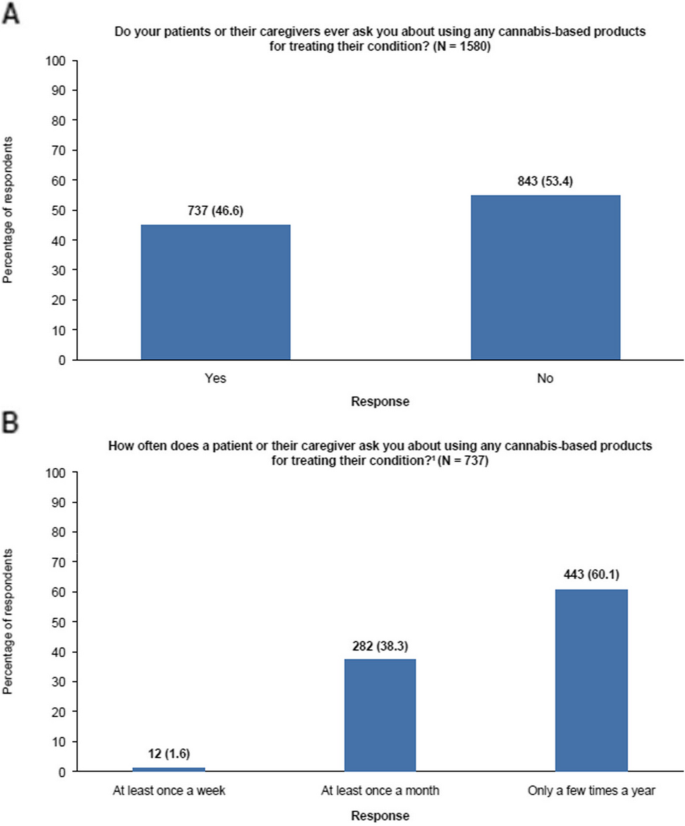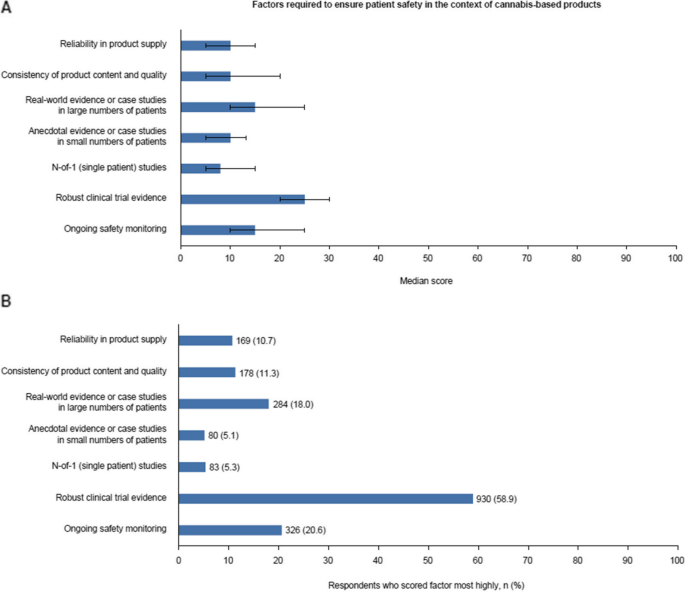The attitudes, knowledge and confidence of healthcare professionals about cannabis-based products | Journal of Cannabis Research
Respondent characteristics
In total, 5872 HCPs were contacted about their interest in completing this survey until recruitment was completed (Table S1). Of the HCPs contacted, 28.5% (n = 1671) agreed to take part via email and were then screened for their eligibility to participate. 5.4% (n = 91) of these HCPs were not eligible to take part or chose not to complete the survey (Fig. S1). 1580 HCPs from 16 countries (comprising Australia, Austria, Brazil, Denmark, France, Germany, Israel, Italy, Japan, Mexico, South Korea, Spain, Sweden, Switzerland, Taiwan, and the United Kingdom) and from five different specialities (neurologists, psychiatrists, general practitioners, pharmacists, and nurses; Table 1) completed all required questions in the survey. Neurologists were the only medical speciality surveyed from countries outside Europe (Table 1).
At the time of completing the survey, respondents had spent a mean of 11.1 years (SD = 7.0) practising in their medical speciality. The mean proportion of time HCPs spent in direct patient care was 85.3% (SD = 8.2), and they reported personally dealing with a mean of 128.6 patients (SD = 63.2) over the course of a month. The neurologists and psychiatrists surveyed were also asked about the proportion of time spent seeing patients in different practice settings. Most of their time was spent practising in university/teaching hospitals (Table S2).
Attitudes of HCPs about cannabis-based products in healthcare
In response to being asked how interesting they felt cannabis-based products were in healthcare in general, the median score among all respondents was 9 (IQR, 8–10) out of 10, representing a high level of interest (Table 2). Respondents were also asked to what extent they agree that cannabis-based products hold therapeutic potential for some patients, and the median score was 6 (IQR, 5–6) out of 7 (Table 2).
When asked to what extent they agree that they are knowledgeable about the range of cannabis-based products in healthcare, the median score was 6 (IQR, 5–6) out of 7 (Table 2). HCPs were also asked to what extent they agree that the way cannabis-based products act in the body is understood, to which a score of 4 (IQR, 4–4) out of 5 was recorded (Table 2). When asked to what extent they agree that cannabis-based products in healthcare are all much the same, the median score was 3 (IQR, 2–4) out of 7 (Table 2).
Interaction of HCPs with patients about cannabis-based products and desire for more information
Just under half (46.6%; n = 737) of HCPs surveyed stated that their patients or their patients’ caregivers ask about using cannabis-based products to treat their condition (Table 3). However, when asked to state the frequency of such questions, 60.1% (n = 443) of HCPs surveyed indicated that they were only asked a few times a year, while 38.3% (n = 282) stated they were asked at least once a month and only 1.6% (n = 12) said they were asked at least once a week (Fig. 1).
Frequency of HCPs’ interactions with patients about cannabis-based products. 1Only the 737 respondents who answered ‘Yes’ to the question “Do your patients or their caregivers ever ask you about using any cannabis-based products for treating their condition?” were asked this question. HCP: healthcare professional
When asked how comfortable they are in discussing cannabis-based products with their patients, the median score across all respondents was 6 (IQR, 6–6) out of 7, suggesting a high level of comfort (Table 3). Similarly, when asked how confident they are in providing their patients with information on the legality and regulations of different cannabis-based products in their country of practice, the HCPs returned a median score of 6 (IQR, 6–6) out of 7 (Table 3). A median score of 5 (IQR, 3–6) out of 7 was obtained when the HCPs were asked about their confidence in providing their patients with information on the evidence underpinning the risks and benefits of different cannabis-based products (Table 3). HCPs strongly agreed that they would feel more confident prescribing cannabis-based products if they had been reviewed and approved by medicines regulators, returning a median score of 6 (IQR, 6–6) out of 7 (Table 3).
HCPs were also asked to what extent they would benefit from receiving further information on various topics relevant to cannabis-based products. For all the topics asked in this question, the HCPs surveyed returned a median score of 6 out of 7 (IQR values for each question can be found in Table 3).
Opinions of HCPs on factors that contribute to patient safety in the context of cannabis-based products
When considering how appropriate it is to prescribe, dispense, or recommend a cannabis-based product to their patients, HCPs must consider the types of evidence that exist to support their efficacy and safety profiles. Respondents were asked to score the relative importance of various factors that contribute to patient safety by allocating a proportion of a total of 100 points to the different areas based on the extent of their importance. The HCPs surveyed scored robust clinical trial evidence most highly, with a median score of 25 (IQR, 20–30) and with 58.9% (n = 930) of respondents selecting it as their highest scoring factor (Fig. 2A and B). Ongoing safety monitoring and real-world evidence or registries in large numbers of patients were assigned the joint second highest score, both with medians of 15 (IQR, 10–25) (Fig. 2A). Of the options provided, N-of-1 (single patient) studies scored the lowest, with a median of 8 (IQR, 5–15; Fig. 2A).
Factors required to ensure patient safety in the context of cannabis-based products. Respondents were asked to score the extent to which various factors should be required to ensure patient safety in relation to cannabis-based products (higher scores indicate higher importance). Respondents scored each factor 0–100, with scores being required to sum 100. Presented is A) the median score for each factor and B) the number of respondents who scored each factor most highly. Error bars represent the IQR. IQR: interquartile range
Comparisons between medical specialities
Additional post hoc analyses were conducted between HCP groups and the overall sample. Responses from the groups were similar, with few nominally significant differences observed between HCPs from the different medical specialities (Tables S3–6). Summarizing, neurologists are significantly more likely to consider cannabis-based products as more interesting that GPs, pharmacists and nurses. Neurologists consider themselves more knowledgeable about the range of these products than GP’s, pharmacists and nurses (Table S3). Neurologists are significantly more comfortable than psychiatrists in discussing these products and significantly more confident about legality and regulation than psychiatrists (Table S5). On the other hand, psychiatrists significantly believe that robust clinical trial evidence is needed in comparison to neurologists (Table S6). Notably, psychiatrists reported being asked most frequently by their patients or their patients’ caregivers about the use of cannabis-based products for treating their condition. 58.6% (n = 41/150) of psychiatrists indicated that they were asked at least once a month; although there was no statistical significance in comparison to the overall HCP population surveyed (38.3%; n = 282/737).
Comparisons between European and non-European neurologists
Neurologists were the only speciality surveyed with representation from outside Europe (Table 1); therefore, additional post hoc analyses were conducted to determine whether there were differences between neurologists practising in European countries and those practising in countries outside Europe. Few differences of nominal significance were observed between neurologists from the two different regions (Tables S7–10).
Impact of prescribing, dispensing and recommending cannabis-based products on HCP confidence and interest in receiving further information
During the survey, HCPs were asked if they had prescribed, dispensed, or recommended any regulatory approved cannabis-based medicines within the past year. In total, 36.3% (n = 573) of the HCPs stated they had, while 63.7% (n = 1007) stated they had not. To explore whether this influenced the respondents’ confidence in discussing cannabis-based products with patients and their interest in receiving further information, a comparison was made between answers from respondents who stated that they had prescribed, dispensed, or recommended a regulatory approved cannabis-based medicine within the past year and respondents who had not. Overall, there were very few nominally significant differences between the two groups. However, when asked about how confident they felt when providing patients with information on the evidence underpinning the risks and benefits of different cannabis-based products, HCPs who had prescribed, dispensed, or recommended cannabis tended to rate their confidence as lower than those who had not, with a median score of 3 (IQR, 3–5) out of 7, compared with 5 (IQR, 4–6) out of 7, respectively (P





